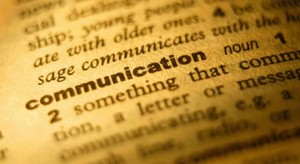 For the first time in a while someone had trouble understanding what I was saying, and it was a function of my accent. After being away from Australia for the last ten and half years my accent has morphed into something that has no homeland. I think of myself as being easy to understand but it reminded me that other than language, dialects and accents we all have different points of view from which we communicate and a different personal view of reality.
For the first time in a while someone had trouble understanding what I was saying, and it was a function of my accent. After being away from Australia for the last ten and half years my accent has morphed into something that has no homeland. I think of myself as being easy to understand but it reminded me that other than language, dialects and accents we all have different points of view from which we communicate and a different personal view of reality.
How we communicate and how effectively we communicate has to do with a lot more than just mastering language. We might have a great message to share, but are we sharing it in a way that does the message justice? Albert Mehrabian conducted a ten year study on the effect of body language and tone in communication and the results indicated that communication is more than just the choice of words. This would strike us as obvious because we all know how different people’s communication styles affect us differently.
In addition to the varied ways of sending communication, each person receives it via various different filters, including age, gender, culture, emotion, the situational context and personal beliefs. Just like a coffee filter separates the coffee grinds from the coffee, these filters influence the listener’s perception and interpretation of the message. Some filters change depending on the moment (emotion and situational context) and others may stay consistent over a long period of time (gender, culture, personal beliefs).
Take time to understand a person and their point of view and you will go a long way to understanding the consistent filters that exist with them. An individual’s personal history, country of origin and upbringing will influence their worldview and their language will reflect that. I see this in my own experience of growing up in Australia and living in Canada, a country which is relatively similar, yet also very different. It is important to take care to respect cultures, customs, and histories that are different from our own.
A situational context filter relates to something that has recently happened. For example, if a senior executive is suddenly let go from a company, then the remaining employees will see all communication in the near future in the light of “might I also get fired” and live in some element of fear in the office. The replacement executive needs to understand this point of view and communicate in such a way that takes this filter into account – ally fears and restore employee confidence.
Personal belief filters are just that – they relate to the belief people have of and relating to themselves. For example, some people have the belief that “everyone is out to get me” and they are a victim. They would then filter everything they hear through this “everyone is out to get me” filter and receive the message differently.
If you’re empathetic to the moment you will recognize the other filters in play. For example, with emotion, people could be happy, sad, anxious, nervous, angry etc. An angry person, for example, is probably not receiving rational information very objectively.
Language that ignores the listener’s emotional state, culture, current life situations, and personal beliefs will miss its mark. Instead of building trust, it will distance us from those who could become friends and allies. Well-chosen language on the other hand can be an extremely powerful success tool.









